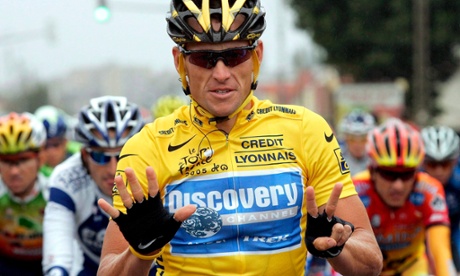
When the Usada announced that it had stripped Lance Armstrong of his seven Tour de France titles, my response was one of relief. In developing Pedal Pusher, our play about the dark years of the Tour de France around the millennium, I had become increasingly convinced that Armstrong – along with the other high profile professional cyclists of his era – had used illegal drugs to improve his performances.
How was it that a relatively unknown kid from Texas was beating the whole of the EPO (recombinant erythropoietin) generation? Was it simply that Armstrong trained harder than the others? Or was it that somehow through recovering from cancer Armstrong had developed physiological and psychological advantages that placed him head and shoulders above the rest?
Drugs have always been part of professional cycling, and the culture that expected cyclists to do whatever it took to maximise their performance existed long before Lance Armstrong. The question of who doped and who didn’t was, to a certain degree, immaterial.
The real issue was the systematic doping of riders by team doctors, and expectation and bullying of team leaders. This meant that the only way aspiring young riders could realistically compete at a high level was to take drugs. The only way to stay clean was not to race.
There are many reasons why Armstrong should be vilified. But perhaps it is time for us to step back and see Armstrong both for the fraud that he was, and also as cycling’s most high profile drugs victim. Maybe in the end he got what he deserved, but there are many others who used the same techniques and broke identical rules who were caught and received lesser penalties.
While it was always a personal decision whether or not to dope – and there were many cyclists who rode clean or chose not to race rather than take the drug – we have to judge Armstrong in the context of the culture that dominated the sport.
But in the end, Armstrong rode faster than any of his rivals, and won the world’s most famous bicycle race seven times in a row. The questions of how he won so decisively are not answered by his EPO use alone. He was the very best of a bad bunch.
Many people now characterise him as one of the sporting world’s greatest cheats, but those who do should consider the words of Armstrong’s closest rival Jan Ullrich.
Several months after Armstrong confessed publicly to Oprah Winfrey, and the secret that had been long suspected was suddenly front page news, Ullrich finally admitted to using EPO throughout his career. “In my view you can only call it cheating on my part when it is clear that I have gained an unfair advantage,” Ullrich said. “That was not the case. All I wanted was everyone to have the same chances of winning.”
Perhaps most telling is the fact that when Armstrong was stripped of his Tour de France victories, the race organisers chose not to award the winners titles to any of his rivals. How far would they have needed to go down the race standings to find a rider who was clean, given that so many of the top riders were using performance enhancing substances.
His years on the bike may have been characterised by fraud and lies, but in the end the only unremarkable thing about Armstrong’s otherwise remarkable career was that he took drugs.
Roland Smith is co-artistic director of Theatre Delicatessen and creator of critically acclaimed play, Pedal Pusher; the true story of Lance Armstrong, Marco Pantani and Jan Ullrich’s battle to become champion of the Tour de France which is showing until Sunday 7 July at the University of Sheffield’s outdoor arts space, Furnace Park

